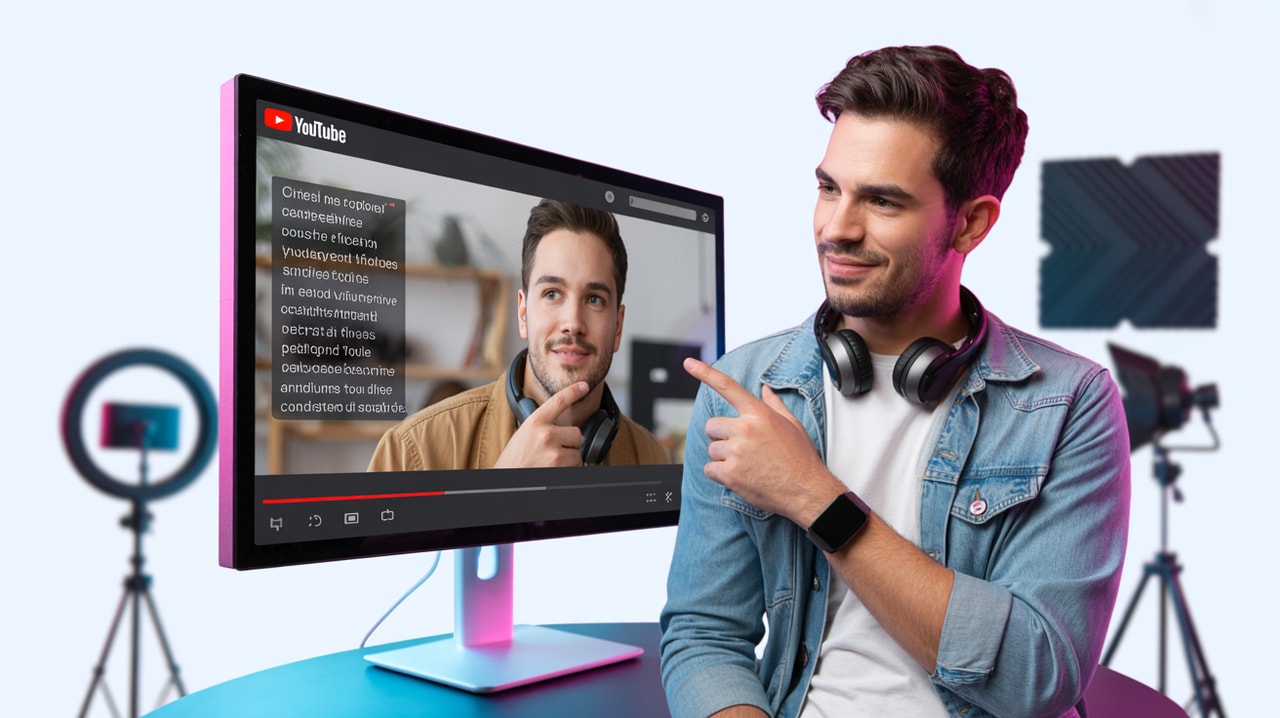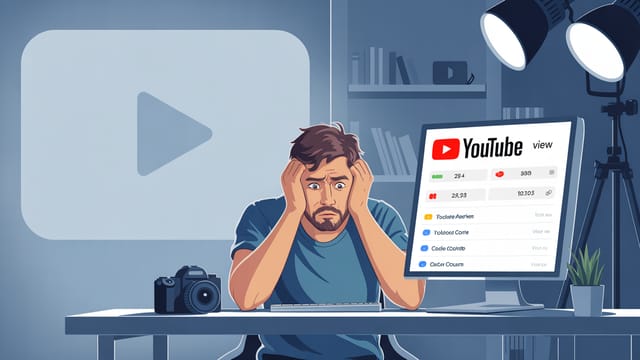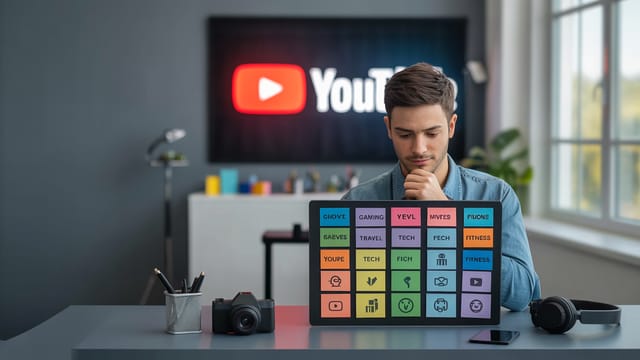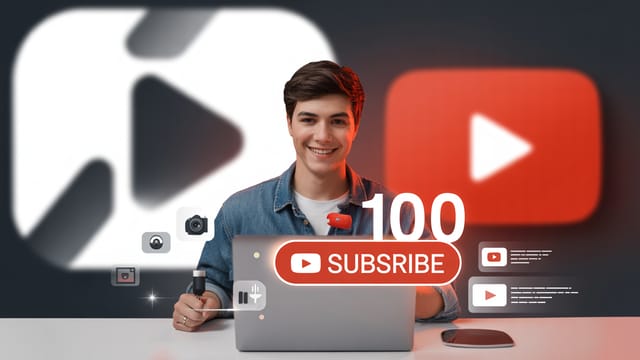
Ready to get your next 10,000 subscribers?
Join thousands of creators who use Subscribr to create faster, better YouTube videos.
Are YouTube Captions Worth It? How to Add Them for Better Engagement
You pour hours into scripting, filming, and editing your YouTube videos. The lights are perfect, the sound is crisp, the edits flow seamlessly. But then comes post-production, and you hit a point where you wonder: "Should I really take the extra time to add captions?"
It feels like just one more step in an already time-consuming process. You're putting in significant time and effort, and you don't want to miss out on any potential engagement opportunities. So, are YouTube captions truly worth the effort?
Absolutely. Adding captions to your YouTube videos isn't just a nice-to-have; it's a crucial step that can significantly boost your video's reach, engagement, and overall performance. It’s a simple yet powerful post-production best practice that contributes directly to your workflow optimization and efficiency in making videos that connect with more viewers.
Let's break down why captions matter and the easiest ways to add them to your content.
Why Captions Are Essential for Your YouTube Videos
Think beyond just showing the words on the screen. Captions unlock several key benefits that directly impact your channel's growth and viewership.
Reach a Wider Audience Through Accessibility
One of the most important reasons to add captions is accessibility. Millions of people worldwide are deaf or hard of hearing. Without captions, your content is simply inaccessible to them. By adding captions, you open your videos up to a massive potential audience you were previously missing.
Beyond hearing impairments, many viewers consume content in environments where they can't listen to audio – on public transport, in noisy places, or late at night while others are sleeping. Captions allow these viewers to follow along and engage with your video, preventing them from clicking away.
Boost Viewer Retention and Engagement
Studies and creator experiences consistently show that captions can dramatically increase viewer retention. Why? Because they keep viewers engaged, even if they're watching without sound or if they're non-native speakers who benefit from reading along.
When viewers can easily follow your content, they're more likely to watch for longer. Higher watch time signals to YouTube that your video is engaging, which can positively impact its visibility. Captions act as a visual anchor, keeping eyes on the screen and minds on your message.
Customizing your caption style with unique fonts, colors, and animations can also become a part of your channel's branding, making your videos more recognizable and visually appealing, further encouraging engagement.
Improve YouTube SEO (In a Modern Way)
While YouTube's algorithm has evolved far beyond simple keyword stuffing, captions still play a role in helping the platform understand your content. YouTube automatically transcribes the audio of your video to create auto-generated captions. This transcription is essentially a text version of everything you say in your video.
Since YouTube analyzes this text, including relevant keywords and topics naturally within your spoken script means they will appear in the automatically generated subtitles or in the caption file you upload. This provides another instance where the algorithm can identify your video's topic and context, reinforcing the subject matter and potentially aiding discoverability for relevant searches. It's not about keyword density in the captions themselves, but about ensuring YouTube fully understands the content of your video by having an accurate text representation.
Should I Put Captions on My YouTube Videos?
Given the significant benefits for accessibility, viewer retention, and even helping YouTube understand your content, the answer is a resounding yes. While it requires some initial effort, the return on investment in terms of increased reach and engagement makes it an indispensable part of a smart YouTube strategy, especially for beginner to intermediate creators looking to grow their audience.
Do Captions Increase YouTube Views?
Indirectly, yes. Captions increase viewer retention and accessibility. When viewers watch your videos for longer and more people can access them, YouTube's algorithm receives positive signals. This can lead to your videos being recommended to a wider audience, ultimately contributing to increased views over time. High retention rates are a key factor in YouTube's recommendation system, and captions are a proven way to boost retention, especially for viewers watching without sound.
What is the Easiest Way to Add Captions to YouTube Videos?
Thankfully, adding captions doesn't have to be a manual, word-by-word slog. There are several efficient methods available in 2025.
1. YouTube's Automatic Captions
YouTube automatically generates captions for most videos using speech recognition technology. This is the easiest method in terms of effort, as YouTube does the work for you.
How to find them:
- Go to YouTube Studio.
- Click "Content" in the left menu.
- Hover over the video you want to edit and click the "Details" (pencil) icon.
- Scroll down and click "Show MORE".
- Scroll down to the "Language and caption certification" section. Your auto-generated captions should appear here after a short time.
Pros: Requires almost no effort from you. Cons: Automatic captions are not always 100% accurate. They can misinterpret words, struggle with accents or background noise, and lack punctuation.
Recommendation: Always review and edit YouTube's auto-generated captions for accuracy before publishing them. You can edit them directly in YouTube Studio.
2. Automatic Captions in Video Editing Software
Many modern video editing programs offer built-in automatic caption generation, often with higher accuracy and more customization options than YouTube's native feature. CapCut, a popular and often free editor, is frequently cited by creators for its robust automatic captioning feature.
How to add automatic captions in CapCut (example):
- Import your video into CapCut.
- Find the "Text" feature (usually in the top menu).
- Look for an "Auto captions" or "Automatic subtitles" option.
- Select the language spoken in your video.
- Click "Generate". CapCut will analyze your voiceover and create a separate caption track.
Pros: Generally more accurate than YouTube's auto-captions, allows for easy styling and customization, integrated into your editing workflow. Cons: Requires using specific software, accuracy can still vary.
Workflow Tip: Generating captions within your editor like CapCut allows you to review and style them as part of your final edit before uploading to YouTube, streamlining your post-production workflow.
3. Uploading a Caption File (SRT)
If you use a dedicated transcription service (paid or free) or create your captions manually in a text editor, you can upload a SubRip Subtitle file (.srt) directly to YouTube.
How to upload an SRT file:
- Follow steps 1-4 in the YouTube Automatic Captions section above to get to the "Language and caption certification" section.
- Click "ADD LANGUAGE" if your video doesn't have a language set.
- Under the "Subtitles" column for your chosen language, click "ADD".
- Click "UPLOAD FILE".
- Choose "With timing" if your SRT file already includes timestamps, or "Without timing" if you'll manually sync it.
- Browse and upload your .srt file.
Pros: Highest accuracy if you use a professional service or manual review, full control over timing and formatting. Cons: Requires an extra step outside of YouTube or your primary editor, can be time-consuming if done manually.
Monetization Angle: For creators who produce a large volume of content or require extremely high accuracy (e.g., educational channels), using a paid transcription or captioning service can be a worthwhile investment to save time and ensure quality. These services typically provide a ready-to-upload SRT file.
Styling Your Captions for Branding and Engagement
Beyond just displaying words, the appearance of your captions can impact viewer engagement. Many editors (and even some online tools) allow you to customize:
- Font: Choose a clean, readable font that matches your channel's aesthetic.
- Color: Select text and background colors that provide good contrast and align with your brand colors.
- Size: Ensure the text is large enough to be easily read on various devices.
- Effects: Add subtle animations, highlights, or outlines to make the text pop, especially useful for keeping viewers engaged in faster-paced videos or Shorts.
Creating a unique caption style helps your channel stand out and makes your videos instantly recognizable.
Integrating Captions into Your Workflow
While adding captions might seem like an extra chore, integrating it smoothly into your post-production process is key to managing the time investment.
Consider captioning as the final polish after your main edit is complete. Using tools with automatic generation capabilities significantly reduces the manual effort. Review and editing are still necessary for accuracy, but it's much faster than typing everything from scratch.
Thinking about captions starts even earlier in the process, during content planning. By using tools like Subscribr, you can research and script your videos more efficiently. Subscribr's AI Script Writer and Research Assistant help you structure your content and ensure your spoken script is clear and well-organized. A clear, well-structured script is easier for automatic captioning tools to transcribe accurately, saving you time in the editing phase. Subscribr helps you optimize your entire workflow, from idea to ready-to-caption video.
Conclusion
Adding captions to your YouTube videos is a critical step for any creator serious about reaching a wider audience and maximizing engagement. While it represents a small investment of time, the benefits in terms of accessibility, viewer retention, and improved understanding by the YouTube algorithm are undeniable.
Don't let the perceived time commitment hold you back. Leverage automatic captioning features in YouTube Studio or your preferred editing software, review for accuracy, and even customize the style to match your brand. By making captions a standard part of your post-production checklist, you're creating more inclusive content that performs better and helps you grow your channel more effectively in 2025 and beyond.





